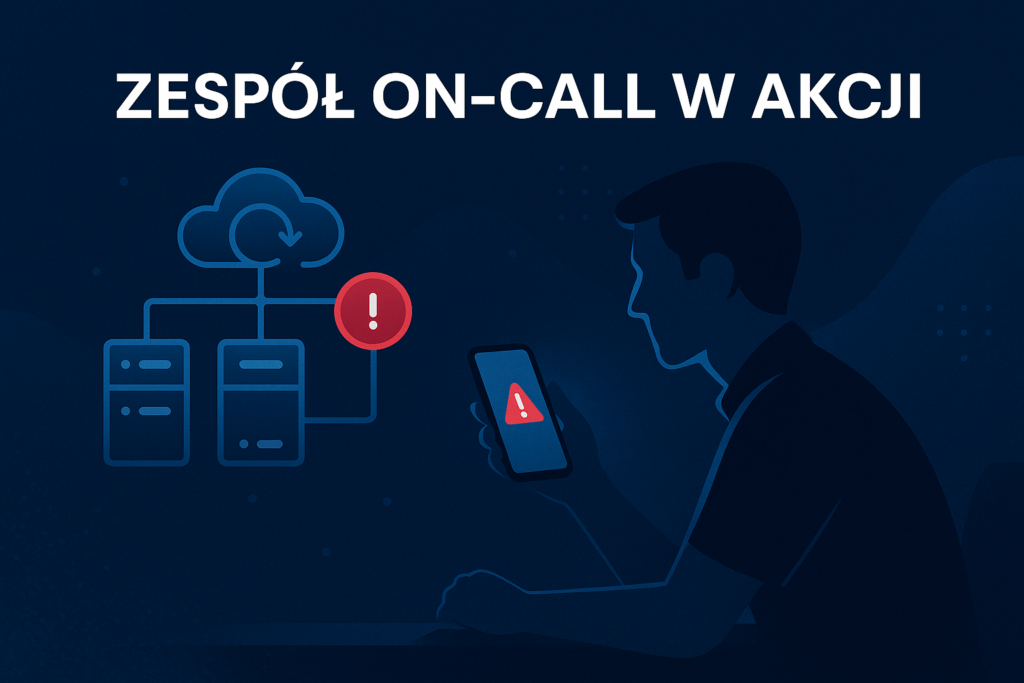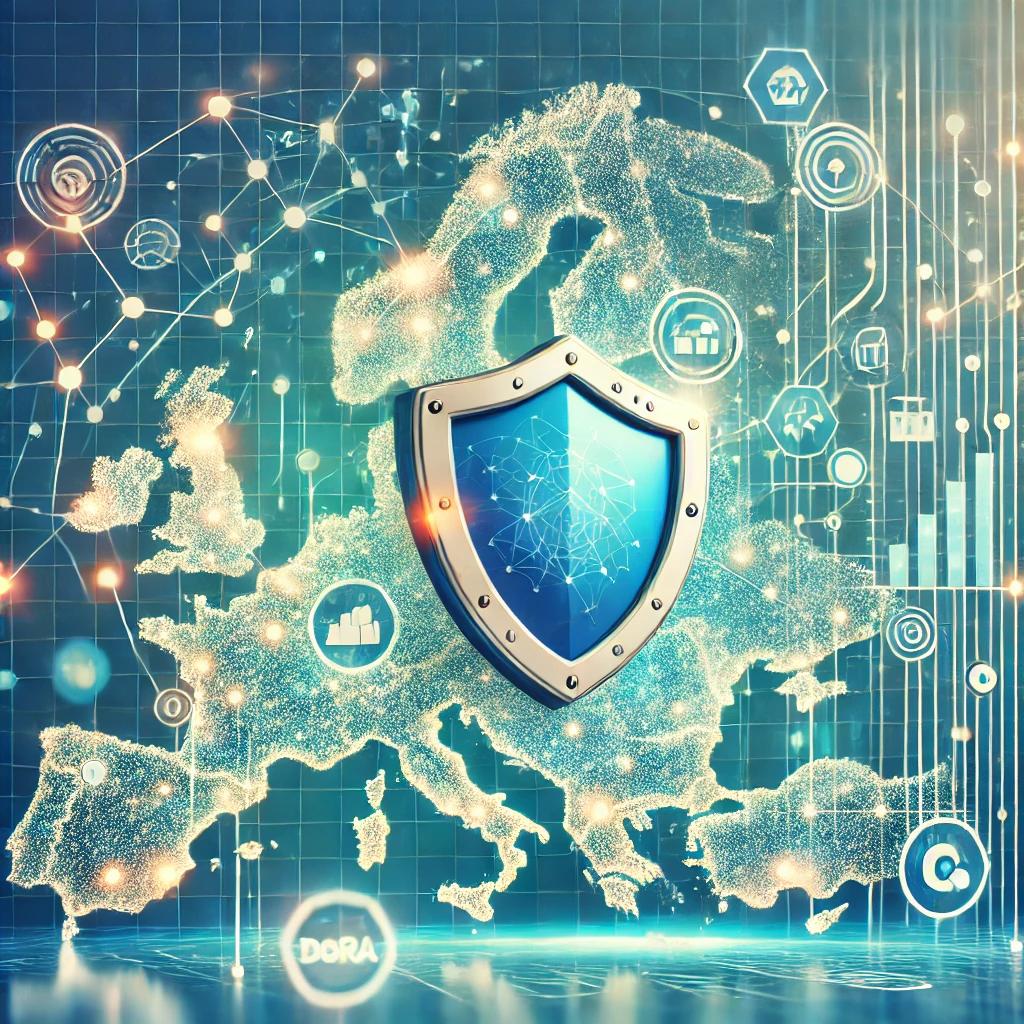Nocturno is a specialized tool designed for 24/7 infrastructure monitoring system and after-hours service oversight. It was created to strengthen companies’ capabilities in identifying issues continuously – regardless of the time of day. Nocturno was designed to integrate easily with your existing IT stack. It connects to popular monitoring tools like Prometheus, Grafana, or Zabbix, and collects real-time data from log sources.
Nocturno offers flexible alerts tailored to emergency scenarios. Instead of relying solely on email, the system sends alerts via Slack, SMS, and webhooks to external tools like messaging apps or ticketing systems. This ensures that the right people are informed of incidents immediately – whether they are working or sleeping. Users can easily configure alert rules through an intuitive interface. It’s possible to set precise scenarios, such as deactivating resources at night or automatically escalating alerts to the next available person.
Nocturno is part of the Wizards product ecosystem. According to the documentation, it integrates with another tool – Detecto, which focuses on detecting sensitive data. This shows Nocturno’s flexibility and its ability to connect with various IT systems.
How It Works: Nocturno’s Key Features
Advanced metrics and log analysis: Nocturno collects real-time data from across the IT infrastructure (servers, databases, network services) and uses intelligent algorithms (including machine learning) to detect anomalies. It identifies unusual patterns early – such as a sudden spike in errors – without needing manual threshold adjustments.
Dynamic thresholds and trend detection: The system automatically adjusts boundary values to match natural fluctuations in load – avoiding false alarms during peak hours and detecting subtle issues when traffic is low. This results in fewer false positives and more effective observability outside business hours.
Flexible alert rules: Administrators can define multi-dimensional conditions that trigger notifications. For example: “If latency increases by more than 30% within 10 minutes and the number of error logs exceeds X, send an alert.” This allows combining various metrics and pinpointing critical issues more accurately.
Automatic escalations and duty schedules: Nocturno supports advanced response scenarios. If the first on-call person doesn’t respond, the system automatically forwards the alert to the next contact – like a team leader, operations board, or responsible engineer.This ensures continuous 24/7 response.
Integration with communication tools: Beyond Slack and SMS, Nocturno can send alerts to any service supporting webhooks (e.g., JIRA, Microsoft Teams, PagerDuty-type apps). This enables smooth collaboration with existing company processes.
Who Benefits the Most from Nocturno?
Nocturno is particularly useful for companies that operate 24/7 or serve clients outside regular hours. In practice, this solution will interest:
- Large organizations (50+ employees) with complex IT environments that can’t afford downtime – hiring additional night staff is costly and rarely justified.
- E-commerce companies offering 24/7 online services – any delay at night may mean lost orders and customers.
- Fintech and banking enterprises – the financial sector is increasingly global, and failure to monitor payment and online banking services around the clock affects reliability and customer trust.
- SaaS providers and tech firms – with high expectations for app availability, continuous service is key to user satisfaction.
All of these companies share a need for 24/7 infrastructure monitoring with near-instant incident response. For them, implementing Nocturno means significantly improving IT operations and peace of mind – knowing their monitoring system never sleeps.

What Do You Gain by Implementing Nocturno?
Deploying Nocturno’s night monitoring brings tangible benefits to your business:
- Time savings: Automated alerts and analysis reduce the time needed to detect issues. Instead of manually reviewing logs, the system informs you of critical events automatically.
- Less stress for on-call teams: With fewer false alarms, engineers sleep better. They know they’ll only be alerted when action is truly needed – boosting morale and reducing burnout.
- Faster incident response: Automatic notifications (via Slack, SMS, etc.) reach the right people instantly – even before sunrise. This shortens the time from detection to resolution.
- Improved SLA metrics: Minimizing downtime helps the company meet or exceed service level agreements. Continuous monitoring and smart escalations reduce SLA violations, enhancing customer loyalty and avoiding penalties.
- Lower risk of customer churn: A night-time outage can hurt your reputation and lead to user attrition. With Nocturno, off-hour incidents are detected and addressed immediately – building trust and ensuring service continuity.
Example Scenario
Imagine your e-commerce company operates 24/7. If the payment module crashes at 3 a.m. and there’s no proper alerting tool, response might be delayed. The issue won’t be spotted until morning, and fixing it will take even longer. Meanwhile, customers try to pay in vain – hurting sales and your brand image.
Now imagine your company has implemented Nocturno. It immediately detects the failure – for example, a spike in payment transaction errors. The system sends a night alert to the on-call team via Slack and mobile phone. Within minutes, someone investigates the issue and disables the faulty service while activating a backup mode. The store continues operating with minimal interruption, avoiding major losses.
The difference is clear. Without Nocturno, your system runs blindly at night, and the on-call team carries the risk of downtime. With Nocturno, alerts reach the right people instantly. They can react quickly, while the system handles most of the work.
Summary and Call to Action
Nighttime system monitoring is now a necessity for companies that want to operate without interruptions. Nocturno by Wizards automates incident detection and response at any hour. This saves time, reduces stress, and ensures that your infrastructure runs smoothly – even while you sleep.
Want to protect your company from the effects of night-time outages?
Get in touch with the Wizards team and schedule a call. See how Nocturno (system monitoring) can support your services and improve infrastructure reliability – no matter the time of day.
In a world where data protection standards are becoming more stringent, and the number of documents is growing exponentially, companies face a major challenge: how to effectively locate and secure personal data across thousands of files, emails, and scans?
Imagine you’re the head of the compliance department. An audit is looming, and you must quickly find where sensitive personal information is hidden. HR, IT, finance departments send in hundreds of files. Stress levels rise. Time is running out. A single overlooked document — a contract with an ID number or a spreadsheet with employee data — could cost the company dearly.
In such situations, Detecto becomes a game-changer — a tool that automatically detects personal data across documents and databases, ensuring compliance with GDPR without wasting weeks on manual searches.
The Challenge: Too Much Data to Handle Manually
Today, personal data hides everywhere: in CVs, invoices, contracts, internal emails, and customer databases. Manually inspecting these resources is not only time-consuming but also highly error-prone. Meanwhile, regulations demand that organizations be able to respond promptly to audits and demonstrate control over the personal data they process.
Detecto leverages advanced artificial intelligence to automate this process. It combines OCR (Optical Character Recognition) and NLP (Natural Language Processing) technologies to search documents, even recognizing poorly formatted or hidden data. In short: it’s like a tireless assistant that never overlooks a detail and operates at speeds unattainable by human teams.
How Detecto Supports Your Business
Detecto brings real, measurable value across different departments:
- Compliance teams can generate reports on data locations, greatly simplifying audit preparation and minimizing regulatory risk.
- HR departments can quickly analyze recruitment documentation and employee records to ensure personal data is protected.
- Finance teams can automatically detect sensitive information hidden in contracts and invoices.
- IT teams can integrate Detecto with internal servers and data repositories, improving information security.
What once took weeks of tedious manual labor can now be completed within hours, thanks to Detecto’s automation.
Practical Use Cases
Imagine if your organization needed to prepare for a GDPR audit. By scanning document servers and selected databases, Detecto could immediately locate all files containing personal data: from identity numbers, names, and addresses to health data and signatures.
Or consider a company merging with another entity — Detecto would quickly map sensitive files that need anonymization before the transfer, preventing data breaches.
In case of a data leak or security incident, Detecto allows rapid analysis of compromised files to determine if personal data was exposed — essential for compliance with data breach notification requirements.
Why Detecto Is the Right Choice
Detecto stands out for several key reasons:
- Accuracy – advanced algorithms understand context and local formats, minimizing false positives.
- Speed – thousands of documents can be analyzed in a fraction of the time needed manually.
- Ease of integration – Detecto works with existing IT infrastructure, with APIs and connectors to popular data environments.
- Security – data is processed securely, ensuring compliance with GDPR requirements.
It’s a solution designed for the real-world challenges organizations face today.
Conclusion: Compliance Through Smart Automation
Automating the detection of personal data is no longer a luxury — it’s a necessity. In an era of ever-increasing regulatory pressure and growing volumes of documents, tools like Detecto help companies not only protect themselves against penalties but also build a culture of responsibility and transparency.
By choosing Detecto, businesses gain something invaluable: peace of mind, knowing that their data compliance processes are under control.
1. What is DORA?
DORA (Digital Operational Resilience Act) is an EU regulation aimed at strengthening the digital resilience of financial institutions. It imposes obligations related to ICT risk management, system resilience testing, and reporting of cyber incidents.
2. Who is affected by DORA regulations?
The regulation applies to a wide range of entities, including banks, investment firms, payment institutions, crypto-asset service providers, and external technology providers offering services to the financial sector.
3. When does DORA come into effect?
DORA came into force on January 16, 2023, but full compliance will be mandatory from January 17, 2025. Financial institutions have a two-year transition period to implement the required procedures.
4. What are the main requirements of the regulation?
Implementation of ICT risk management strategies.
Testing the digital resilience of IT systems.
Reporting cyber incidents.
Managing risks related to technology providers.
Sharing threat intelligence within the financial sector.
5. What penalties apply for non-compliance with DORA?
Failing to comply with DORA can result in high financial penalties, reaching several million euros. Companies also face increased risks of cyberattacks and loss of trust from clients and business partners. In extreme cases, regulators may impose operational restrictions or enforce additional supervisory measures.
6. How to prepare a company for DORA compliance?
Conduct an audit of IT security policies.
Implement cybersecurity testing and monitoring systems.
Train employees on the new regulations.
Develop ICT incident management plans.
7. What impact does DORA have on the financial sector?
DORA raises IT risk management standards and enforces a priority focus on cybersecurity. Financial institutions must adopt stricter system monitoring procedures and conduct regular cybersecurity resilience tests.
Mandatory penetration testing will help detect security vulnerabilities.
Faster incident reporting will improve transparency and accountability.
Stricter oversight of technology providers will require audits and security assessments.
As a result, DORA will enhance data security for customers and improve the sector’s resilience to cyber threats.
8. Does DORA affect cooperation with IT service providers?
Yes. Financial institutions must closely monitor technology providers, conduct audits, and enforce compliance with DORA regulations.
9. Key Steps to Implement DORA in a Company
Regulatory compliance analysis – Conduct an audit of IT systems and security policies.
Updating security procedures – Align ICT risk management standards with DORA requirements.
Implementing monitoring and testing tools – Ensure resilience against cyber threats.
Employee training – Raise awareness of the new regulations.
Developing incident reporting procedures – Enable effective threat response.
10. Challenges in Implementing DORA
Implementation costs – New standards may require significant investments.
Lack of ready-made solutions – Not all companies have adequate IT structures in place.
Integration with providers – Audits and system adaptations may affect business partnerships.
Organizational culture change – Effective implementation requires commitment from management and staff.
11. Why Take Action Now?
Although full DORA compliance will be mandatory from 2025, companies should start preparing as soon as possible.
Early implementation helps avoid penalties and strengthen cybersecurity.
Companies that have already adopted DORA gained greater operational stability and better reputations.
Advanced threat monitoring systems will allow faster response to attacks.
By implementing DORA now, organizations can avoid last-minute investments and better protect their systems from increasing cyber threats.

Updating your CV clause 2025 is crucial for legal and professional job applications. Under GDPR, recruiters can process your data only with explicit consent.
Why Is a GDPR Clause Important?
Your CV includes personal details like name, contact info, education, and work experience. Without a proper clause, recruiters cannot legally process your application.
Recommended GDPR Clause for 2025
If no specific wording is required, use:
“I consent to the processing of my personal data by [company name] for recruitment purposes.”
For extended compliance:
“I consent to the processing of my personal data as per the Personal Data Protection Act (Journal of Laws 2018, item 1000) and Regulation (EU) 2016/679 (GDPR).”
To allow future recruitment consideration:
“I consent to the processing of my data for future recruitment by [company name].”
How to Add the Clause to Your CV?
Place it at the bottom of your CV in a smaller font. Ensure the text is clear and specifies data processing purposes.
Final Recommendations
A GDPR-compliant CV clause is essential for a professional application. Regularly update it to match current legal standards and employer expectations. Proper placement and wording ensure compliance and enhance your credibility with recruiters. CV clause 2025.

The Digital Operational Resilience Act (DORA) is a European Union regulation that now applies to all financial institutions. Its primary goal is to enhance the financial sector’s resilience to digital threats. Cyberattacks have become one of the key challenges for the industry in recent years. DORA financial regulations – learn more.
The new regulations introduce unified ICT (Information and Communication Technology) risk management principles. Their purpose is to ensure financial market stability. Additionally, they enhance customer protection against cyber threats.
DORA not only imposes obligations on financial institutions but also changes the way they approach cybersecurity. The new rules require the implementation of comprehensive risk management systems and IT infrastructure resilience testing against various types of attacks. Institutions must take specific steps to comply with these regulations. Non-compliance may result in heavy financial penalties and a loss of trust from customers and business partners.
What Requirements Must Financial Institutions Meet?
DORA mandates financial institutions to implement new ICT risk management procedures to strengthen resilience against cyber threats. This includes internal organizational processes and oversight of external providers offering IT services to the financial sector. Companies must apply strict data protection mechanisms, ensure business continuity, and regularly test the resilience of their systems.
The new regulations emphasize cyber incident reporting and the implementation of preventive measures against future attacks.
Companies must develop strategies for responding to cyber threats. They should also implement communication procedures that enable rapid reporting of irregularities to regulatory authorities.
DORA also highlights managing ICT service providers. Financial institutions must carefully assess risks related to external IT systems and conduct compliance audits with the new regulations.
What Happens to Companies That Do Not Comply with DORA?
Non-compliance with DORA carries serious consequences. It can impact both financial stability and the reputation of financial institutions.
Financial penalties are just one part of the problem. An even greater threat is the increased vulnerability to cyberattacks. These attacks can result in customer data theft, operational paralysis, and even significant financial losses.
Failing to comply with DORA also weakens trust among customers and business partners. In today’s world, data security is a key factor in choosing financial services. Companies that fail to meet the new requirements risk losing competitiveness in the market.
Financial institutions must act quickly to comply with regulations. Only in this way can they avoid severe consequences of negligence.

How to Meet DORA Requirements?
Adapting to DORA requires a comprehensive approach and the involvement of the entire organization. The first step should be a detailed review of IT security policies and an assessment of the current resilience of systems to cyber threats. Companies should also audit their ICT service providers to ensure compliance with regulatory requirements and eliminate any potential security risks.
Cybersecurity testing is another key component of DORA compliance. Companies should regularly conduct penetration tests and vulnerability assessments to identify and eliminate weaknesses in their systems. Implementing new incident management procedures is essential to ensure a quick and effective response to potential threats.
Employee training is also crucial for DORA preparation. Cyber threat awareness and knowledge of incident response procedures must be at a high level for the entire organization to function in accordance with the new regulations. Companies should also invest in modern threat monitoring tools and automate security management processes. This will enable continuous risk analysis and minimize potential damages.
DORA – A New Reality for the Financial Sector
DORA financial regulations is changing how financial institutions manage their ICT systems. It places a strong focus on security, operational resilience, and digital risk management.
The new regulations are already in effect. Companies that have not yet adjusted should quickly implement the necessary procedures. Non-compliance increases the risk of cyberattacks and may also lead to legal and financial consequences.
The financial sector has no choice—it must adapt to these new realities. This requires a strategic and long-term approach to digital resilience.
DORA is not just an obligation. DORA financial regulations are also an opportunity to improve security and risk management. Companies should approach these changes with full commitment. By doing so, they will not only meet regulatory requirements but also build a stronger and more resilient organization prepared for future challenges.
The European Union has introduced an updated directive, NIS2, to address growing cyber threats. This regulation replaces the 2016 version and sets stricter security standards. It aims to protect networks and information systems in key economic sectors. NIS2 enhances security across the EU by introducing uniform requirements. It also expands protection to new areas of activity.
Objectives of the NIS2 Directive
The primary objective of NIS2 is to strengthen digital resilience by protecting strategic sectors such as energy, transport, healthcare, finance, and digital services. These measures are intended to ensure consistency of regulations across the European Union, eliminating legal gaps between member states. It is particularly important for entities responsible for critical services to effectively manage cybersecurity incidents and minimize their impact.
Key Changes Introduced by NIS2
The new regulations introduce several significant changes. First and foremost, the scope of sectors covered by the protection has been expanded, including postal services, waste management, and the chemical industry. Companies are categorized as either “essential” or “important,” allowing requirements to be tailored based on the significance of their operations. Stricter provisions also include increased financial penalties for non-compliance, reaching up to 10 million euros or 2% of a company’s global annual revenue.
Responsibilities of Businesses
For businesses, the NIS2 directive means implementing advanced risk management systems and conducting regular cybersecurity analyses. Companies will need to establish detailed procedures for reporting incidents to the appropriate authorities and ensure adequate employee training. While this may entail additional costs, it will build customer trust and minimize losses resulting from potential threats.
Impact on Consumers
Consumers are also affected by these changes, though less directly. The new regulations will improve the protection of personal and financial data. This will enhance security when using online services like internet banking and online shopping. Additionally, more stable and resilient information systems will lower the risk of disruptions. This applies to critical services such as healthcare and energy supplies.

Implementation of NIS2 in Poland
In Poland, implementing the NIS2 directive requires amending the National Cybersecurity System Act, which must be completed by October 2024. The new regulations will strengthen the role of national supervisory authorities and impose additional obligations on entities responsible for critical infrastructure. In the long term, this will contribute to increased stability and security across the entire economy.
What Does NIS2 Mean for Businesses and Consumers?
The NIS2 directive is an important step towards better digital protection in Europe. Both businesses and consumers will benefit from more secure networks and systems, although implementing these requirements will demand engagement and investment. In the long-term perspective, the benefits of stability and personal data protection are invaluable.
Summary
NIS2 is the European Union’s response to rising cyber threats. It sets new security standards for key economic sectors. For businesses, this requires investment in advanced protection systems. These efforts will enhance customer trust and operational stability. Consumers will benefit from better data protection and improved digital service security. The directive’s implementation in Poland strengthens digital resilience across the EU.
On April 18, 2024, the Polish Government Legislation Center published a draft law. It implements the DORA in Poland regulation (Digital Operational Resilience Act) and Directive 2022/2556 into Polish law. This draft introduces amendments to several financial sector laws. The amendments align the domestic legal system with EU requirements for digital operational resilience.
DORA in Poland: Is the New Law Necessary?
The DORA regulation is directly applicable, meaning it does not require implementation into
Polish law. However, certain provisions, such as designating supervisory authorities or
establishing detailed rules for financial entities, necessitate adjustments to national
legislation.
For this reason, the Ministry of Finance proposed amending laws, such as the Banking Law,
the Payment Services Act, and the Financial Instruments Trading Act. These amendments
are primarily technical and aim to facilitate the implementation of the DORA regulation in
Poland.
Scope of Application
The DORA regulation allows for excluding certain entities, such as credit unions (SKOKs) or
Bank Gospodarstwa Krajowego, from its scope. However, Polish legislators decided to
include these institutions to ensure uniform application of the regulations across the financial
sector.
The draft law exempts key banking and financial sector entities from most provisions of the Polish Cybersecurity Act. However, these entities are not entirely exempt from domestic regulations. Their obligations are adjusted to meet DORA requirements.

KNF as the Supervisory Authority
The draft law designates the Polish Financial Supervision Authority (KNF) as the body
responsible for overseeing compliance with DORA regulations. As part of its new powers,
the KNF will be able to:
● Supervise the activities of financial entities regarding digital resilience.
● Impose administrative penalties, including fines of up to PLN 20,869,500 or 10% of
annual revenue.
● Issue public statements identifying individuals or companies responsible for
violations.
● Temporarily suspend the use of services provided by key external ICT providers.
The KNF will also have the authority to request access to data transmission records and
require financial entities to report contractual arrangements related to ICT services.
Reporting of Contractual Arrangements
The draft law clarifies the reporting requirements for financial entities to the KNF, including:
● A 14-day deadline for notifying planned contractual arrangements regarding ICT
services for critical functions.
● Annual reports to be submitted by January 31 each year, starting in 2026.
Highlighting Innovation
The introduction of DORA regulations can also significantly contribute to the development of
technology in the financial sector. These regulations encourage the adoption of modern
solutions such as artificial intelligence (AI) and blockchain, which enhance digital security.
Implementing innovative technologies will enable financial institutions to better monitor risks,
streamline operations, and build customer trust. Integrating such tools can also support the
sector’s competitiveness on an international scale.
Entry into Force and Next Steps
The draft law will take effect on January 17, 2025. This date coincides with the start of the DORA regulation. Public consultation feedback is under review. The draft may undergo further modifications.
In the era of digitization, managing personal data becomes increasingly complex and demanding. In the global business space, understanding and complying with international data protection regulations is not just a legal issue but also an element that builds trust among customers and business partners. Discussing the major data protection systems will help companies better adjust their strategies.
Data Protection in the European Union: General Data Protection Regulation (GDPR)
The General Data Protection Regulation, known as GDPR, introduced in the European Union in 2018, is a key element in data regulation. It imposes a range of obligations on businesses, both those located in the EU and those processing EU residents’ data. Companies must ensure a high level of personal data protection, which includes obtaining clear consent for processing and notifying any data breaches. Moreover, GDPR allows individuals to access their data, rectify it, delete it, or limit its processing.
GDPR also requires companies to conduct regular audits and train employees to increase awareness and understanding of data protection principles. This comprehensive regulation requires companies not only to comply with the rules but also to actively manage data processing operations.
California Consumer Privacy Act (CCPA)
Like GDPR, CCPA, which took effect in California, provides state residents control over personal data collected by businesses. This act gives the right to access data, delete it, and opt-out of its sale. CCPA is often compared to GDPR due to similarities in the rights of data subjects, but it also contains unique elements such as clear definitions of data sale and detailed requirements for children’s privacy protection.
Companies operating in California must adjust their operations to meet CCPA requirements, often involving modifications to IT systems and data processing procedures. Effective CCPA implementation requires understanding the detailed requirements of the act and applying best data management practices.
Comparison with Other Global Regulations
Data protection regulations are not limited to Europe or California. Countries around the world, from Brazil to China, are introducing their own laws that aim to protect the privacy of their citizens. In Brazil, the General Data Protection Law (LGPD) introduces rules similar to GDPR, while in China, the Personal Information Protection Law (PIPL) responds to the challenges of digitization and massive data processing.
For international companies that must operate across different jurisdictions, it is crucial to understand the differences and similarities between these regulations. Complying with global regulations requires not only knowledge of the law but also flexibility in adapting business processes.
Strategies for Ensuring Compliance
Ensuring compliance with international data protection regulations requires a strategic approach. Companies should consider implementing harmonized data protection policies that meet the highest standards set by all applicable regulations. Additionally, investments in modern technologies help monitor data flow and manage it according to legal requirements. Regular employee training is also key to ensuring that everyone involved in data processing understands their obligations.
Conclusion
In the global economy, where data is the new “gold,” understanding and complying with international data protection regulations is essential for every company. This knowledge not only protects against the risk of legal penalties but also strengthens a company’s position as a responsible market participant. A proactive approach to personal data management and adherence to international data protection standards is crucial in building trust and lasting relationships with customers worldwide.

In an era where personal data is highly valuable, privacy protection becomes one of the most significant challenges for companies and organizations worldwide. In response to growing privacy concerns, pseudonymization emerges as a key tool that can help minimize the risk of data breaches while allowing further data processing. This article will explore what pseudonymization is, its advantages and disadvantages, and how it can be effectively implemented.
What is Pseudonymization?
Pseudonymization is a process of transforming personal data in such a way that it cannot be directly attributed to a specific individual without the use of additional information. This additional information is stored separately and is subject to strict technical and organizational measures to prevent unauthorized use. Unlike full anonymization, pseudonymization is a reversible process, meaning that data can be re-identified with appropriate measures.
Advantages of Pseudonymization
- Privacy Protection: This data transformation significantly reduces the risk of privacy breaches, which is crucial in the context of processing large datasets.
- Regulatory Compliance: Processing pseudonymized data complies with legal regulations, such as GDPR, which impose strict requirements on personal data protection.
- Data Security: Even in the case of a data breach, pseudonymization ensures that the data will not be immediately identifiable, reducing the risk of unauthorized use.
- Enabling Analysis and Research: It allows the use of data for analytical, research, and testing purposes without compromising the privacy of the individuals concerned.
Disadvantages and Risks of Pseudonymization
- Reversibility: The main challenge of pseudonymization is its reversibility. With appropriate additional information, it is possible to re-identify the data.
- Risk of De-anonymization: There is a risk that pseudonymized data could be identified by combining it with other datasets or if the pseudonymization techniques are insufficient.
- Securing Additional Information: It is crucial to securely store and manage the additional information that allows the reversal of the pseudonymization process. Otherwise, the risk of data identification increases.
- Limitations in Full Data Protection: Pseudonymization does not completely eliminate the risk of personal data breaches, as the data is still considered personal data subject to legal regulations.
Pseudonymization Techniques
- Data Masking: Concealing parts of data, e.g., replacing parts of a social security number with “X”.
- Hashing: Transforming personal data into unique strings (hashes) using a hashing function.
- Encryption: Applying encryption algorithms to transform data, which can only be decrypted with the appropriate key.
- Tokenization: Replacing actual data with special tokens that can be reversed using the appropriate mapping system.
Implementing Pseudonymization in Practice
To effectively implement pseudonymization, organizations should follow several key steps:
- Risk Assessment: Conducting a risk assessment to understand which data requires pseudonymization and which techniques will be most effective.
- Choosing Appropriate Techniques: Selecting suitable pseudonymization techniques based on the nature of the data and processing objectives.
- Employee Training: Training employees responsible for data processing on best practices and pseudonymization procedures.
- Monitoring and Auditing: Regularly monitoring and auditing pseudonymization processes to ensure they are effective and compliant with regulations.
Conclusion
Pseudonymization is a crucial tool in personal data protection, especially in the context of the growing number of data breach threats. Although it is not without its flaws, its advantages in terms of privacy protection and regulatory compliance make it a valuable element of data management strategies. The key to effectively utilizing pseudonymization is careful planning, selecting appropriate techniques, and regular monitoring and auditing processes to ensure maximum protection of personal data.
In an era where personal data is highly valuable, privacy protection becomes one of the most significant challenges for companies and organizations worldwide. In response to growing privacy concerns, pseudonymization emerges as a key tool that can help minimize the risk of data breaches while allowing further data processing. This article will explore what pseudonymization is, its advantages and disadvantages, and how it can be effectively implemented.
What is Pseudonymization?
Pseudonymization is a process of transforming personal data in such a way that it cannot be directly attributed to a specific individual without the use of additional information. This additional information is stored separately and is subject to strict technical and organizational measures to prevent unauthorized use. Unlike full anonymization, pseudonymization is a reversible process, meaning that data can be re-identified with appropriate measures.
Advantages of Pseudonymization
- Privacy Protection: This data transformation significantly reduces the risk of privacy breaches, which is crucial in the context of processing large datasets.
- Regulatory Compliance: Processing pseudonymized data complies with legal regulations, such as GDPR, which impose strict requirements on personal data protection.
- Data Security: Even in the case of a data breach, pseudonymization ensures that the data will not be immediately identifiable, reducing the risk of unauthorized use.
- Enabling Analysis and Research: It allows the use of data for analytical, research, and testing purposes without compromising the privacy of the individuals concerned.
Disadvantages and Risks of Pseudonymization
- Reversibility: The main challenge of pseudonymization is its reversibility. With appropriate additional information, it is possible to re-identify the data.
- Risk of De-anonymization: There is a risk that pseudonymized data could be identified by combining it with other datasets or if the pseudonymization techniques are insufficient.
- Securing Additional Information: It is crucial to securely store and manage the additional information that allows the reversal of the pseudonymization process. Otherwise, the risk of data identification increases.
- Limitations in Full Data Protection: Pseudonymization does not completely eliminate the risk of personal data breaches, as the data is still considered personal data subject to legal regulations.
Pseudonymization Techniques
- Data Masking: Concealing parts of data, e.g., replacing parts of a social security number with “X”.
- Hashing: Transforming personal data into unique strings (hashes) using a hashing function.
- Encryption: Applying encryption algorithms to transform data, which can only be decrypted with the appropriate key.
- Tokenization: Replacing actual data with special tokens that can be reversed using the appropriate mapping system.
Implementing Pseudonymization in Practice
To effectively implement pseudonymization, organizations should follow several key steps:
- Risk Assessment: Conducting a risk assessment to understand which data requires pseudonymization and which techniques will be most effective.
- Choosing Appropriate Techniques: Selecting suitable pseudonymization techniques based on the nature of the data and processing objectives.
- Employee Training: Training employees responsible for data processing on best practices and pseudonymization procedures.
- Monitoring and Auditing: Regularly monitoring and auditing pseudonymization processes to ensure they are effective and compliant with regulations.
Conclusion
Pseudonymization is a crucial tool in personal data protection, especially in the context of the growing number of data breach threats. Although it is not without its flaws, its advantages in terms of privacy protection and regulatory compliance make it a valuable element of data management strategies. The key to effectively utilizing pseudonymization is careful planning, selecting appropriate techniques, and regular monitoring and auditing processes to ensure maximum protection of personal data.
